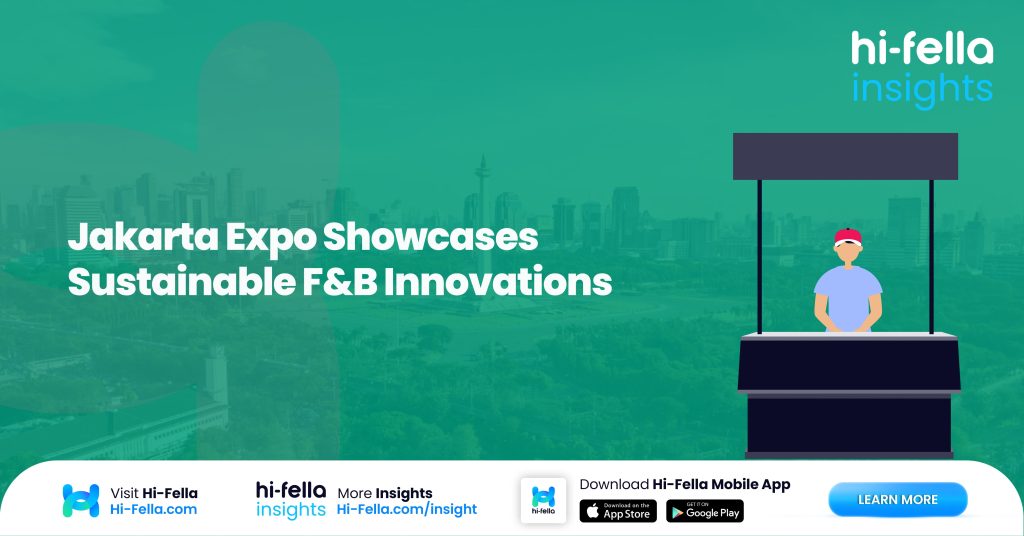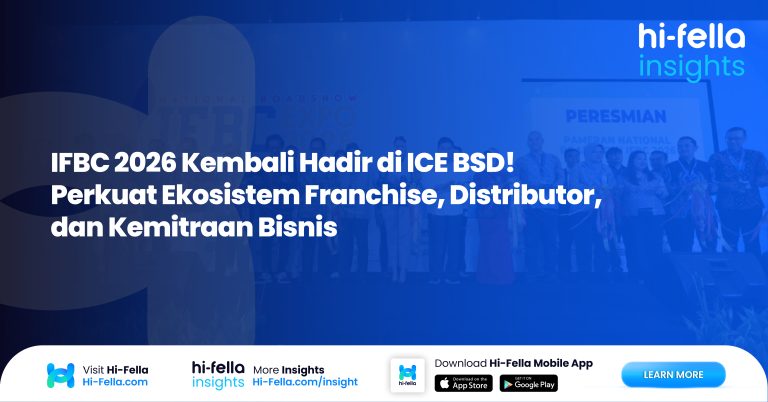In recent years, the global food and beverage (F&B) industry has experienced a paradigm shift toward sustainability, with growing pressure to adopt eco-friendly practices, reduce environmental impact, and promote ethical sourcing. At the forefront of this movement is the Jakarta Expo, an event that highlights the latest innovations in sustainable F&B practices. From alternative proteins to smart packaging, the Expo showcases the groundbreaking solutions that are reshaping the industry. As global consumer and investor expectations shift, businesses must embrace these changes to remain competitive and meet the increasing demand for sustainability.
This article explores the global shift toward sustainable F&B practices, Indonesia’s role as a key player in sustainable supply chains, the innovations featured at the Jakarta Expo, and how businesses can leverage global networks to stay ahead in this evolving market.
Table of Contents
Global Shift Towards Sustainable Food & Beverage Practices
The demand for sustainable food and beverage products is no longer a passing trend—it is a global movement reshaping the industry. International markets, especially in the EU, US, and Asia-Pacific regions, are increasingly requiring businesses to adopt more sustainable practices. Consumers, investors, and governments are all pushing for a shift toward greener solutions, making sustainability a critical factor for long-term success in the F&B sector.
Eco-Friendly Packaging and Plant-Based Alternatives
One of the most noticeable trends in the sustainable F&B sector is the growing demand for eco-friendly packaging. Traditional plastic packaging is being replaced by alternatives like biodegradable materials, recyclable plastics, and compostable packaging. As environmental awareness grows, consumers and companies are keen to reduce plastic waste and the environmental footprint of food packaging.
Additionally, the market for plant-based alternatives has seen a tremendous rise. Meat substitutes made from plants are gaining popularity due to their lower environmental impact compared to traditional meat production, which is known for contributing to deforestation, water usage, and greenhouse gas emissions. Plant-based beverages, dairy alternatives, and plant proteins have become staples on the menus of many global food chains, and their demand is only set to rise.
Transparent Sourcing and Traceability
Consumers today are not just concerned about the end product—they want to know the story behind it. Transparent sourcing and traceability are becoming essential requirements for businesses, especially as consumers demand to know where their food comes from and how it is produced. Brands are now required to disclose information about their supply chains, from farm to table, ensuring that products are ethically sourced, meet environmental standards, and support fair labor practices.
For businesses in the F&B industry, sustainability is not just about meeting consumer expectations but also about staying competitive in the global market. Major international markets, especially in Europe and the US, now demand sustainability certifications, such as Fair Trade, Rainforest Alliance, and RSPO, to ensure compliance with eco-friendly practices.
Indonesia’s Role as a Key Player in Sustainable F&B Supply Chains
Indonesia, a leading exporter of key commodities like coffee, cocoa, palm derivatives, and spices, plays a critical role in the global F&B supply chain. As a major agricultural producer, the country has increasingly embraced sustainable practices to align with international standards and meet the growing demand for eco-friendly products.
Sustainable Practices in Indonesian Agriculture
In response to the growing global demand for sustainable sourcing, Indonesian producers have adopted practices that prioritize environmental preservation and social responsibility. Fair Trade, Rainforest Alliance, and RSPO certifications have become benchmarks for producers in Indonesia, helping them improve product quality, increase transparency, and access international markets. These certifications not only ensure that products meet the environmental and social standards demanded by global consumers but also provide producers with a competitive edge in the global marketplace.
For example, Indonesia’s coffee and cocoa industries are increasingly moving towards organic farming and fair trade practices, ensuring that farmers receive fair compensation and are empowered to maintain environmentally friendly farming practices. Palm oil production, which has faced significant criticism for deforestation and environmental destruction, is also undergoing a transformation, with producers shifting toward RSPO-certified palm oil, which guarantees that the palm oil is produced sustainably and without contributing to deforestation.
Indonesia’s Growing Influence in Sustainable F&B Markets
Indonesia’s adoption of sustainable practices is helping solidify its position as a key player in the global F&B supply chain. As demand for sustainable products grows, Indonesian producers are finding new markets for their products, which are increasingly valued for their ethical sourcing and eco-friendly credentials. The country’s ability to provide high-quality, sustainably produced goods has made it an attractive partner for global businesses seeking to improve their supply chain sustainability.
Cutting-Edge Innovations Highlighted at Jakarta Expo
The Jakarta Expo is showcasing some of the most innovative solutions in the F&B sector. The event brings together leaders in sustainability, offering businesses the opportunity to explore new technologies and trends that are transforming the industry.
Alternative Proteins and Meat Substitutes
One of the standout innovations at the Jakarta Expo is the growing variety of alternative proteins and meat substitutes. These innovations include lab-grown meats, plant-based proteins, and insect proteins, all of which provide sustainable alternatives to traditional meat production. With global concerns over the environmental impact of livestock farming, alternative proteins offer a more sustainable and ethical solution for feeding the world’s growing population.
Smart Packaging and Waste Reduction Technologies
Smart packaging is another innovation gaining traction. These packaging solutions include features like QR codes and RFID tags, which provide consumers with detailed information about the product’s origin, shelf life, and environmental impact. Additionally, smart packaging can help reduce food waste by providing real-time data on product freshness and consumption patterns.
Food Waste Reduction Technologies are also at the forefront of the sustainability push, with new systems designed to minimize waste at all stages of the food production and distribution process. These technologies focus on extending shelf life, reducing spoilage, and recycling waste materials into new products, contributing to a more circular food system.
Digital Traceability Tools
With sustainability becoming a significant concern for both consumers and businesses, digital traceability tools are gaining popularity. These tools allow food companies to track and verify the journey of their products from farm to table, ensuring that they meet ethical and environmental standards. Digital traceability also offers consumers greater transparency and confidence in the sustainability claims of the products they buy.
At the Jakarta Expo, many exhibitors showcased how digital tools can provide real-time tracking of food production, processing, and distribution, enabling better monitoring of environmental impact and ensuring product integrity.
Investor and Consumer Demand Driving Market Growth
The global sustainable F&B market is experiencing rapid growth, driven by both investor interest and shifting consumer preferences. As younger generations, particularly millennials and Gen Z, become more conscious of their environmental footprint, they are increasingly prioritizing ethical, sustainable products when making purchasing decisions.
Market Size and Growth Projections
According to recent market research, the global sustainable F&B market is expected to reach $300 billion by 2025, growing at a compound annual growth rate (CAGR) of over 10%. The increasing demand for plant-based foods, sustainable packaging, and ethically sourced products is a significant factor in this growth.
Consumer Behavior Shifts
Studies show that millennials and Gen Z consumers are more likely to purchase from brands that align with their values, including those that prioritize sustainability, fair trade, and environmental impact. This consumer behavior shift is reshaping the food and beverage sector, with companies increasingly investing in sustainability to meet the expectations of this powerful demographic.
Investor Interest in Green Businesses
Sustainability is also a key focus for investors. In recent years, there has been a significant increase in green investments in the F&B sector. Investors are keen to support businesses that are committed to reducing their environmental impact and promoting sustainable practices. This trend is expected to continue as the global focus on climate change intensifies and more companies seek to align with the United Nations Sustainable Development Goals (SDGs).
Join Hi-Fella to Connect with Suppliers and Buyers Around the World
For businesses in the food and beverage industry, staying ahead of sustainable trends and innovations is crucial to maintaining a competitive edge. Hi-Fella provides a global business networking platform where suppliers, buyers, and innovators in the sustainable F&B sector can connect, collaborate, and form partnerships.
By joining Hi-Fella, you gain access to a worldwide network of businesses, suppliers, and investors who are driving sustainability in the F&B sector. Whether you’re looking to source sustainable products, explore new markets, or forge strategic partnerships, Hi-Fella can help you stay ahead in the evolving global F&B landscape.
The future of food and beverage is sustainable, and Hi-Fella is here to help you connect with the right partners and opportunities. Join Hi-Fella today and be part of the global movement towards a more sustainable, ethical, and innovative food system. Stay ahead of trends, expand your network, and position your business for success in the thriving sustainable F&B market.








